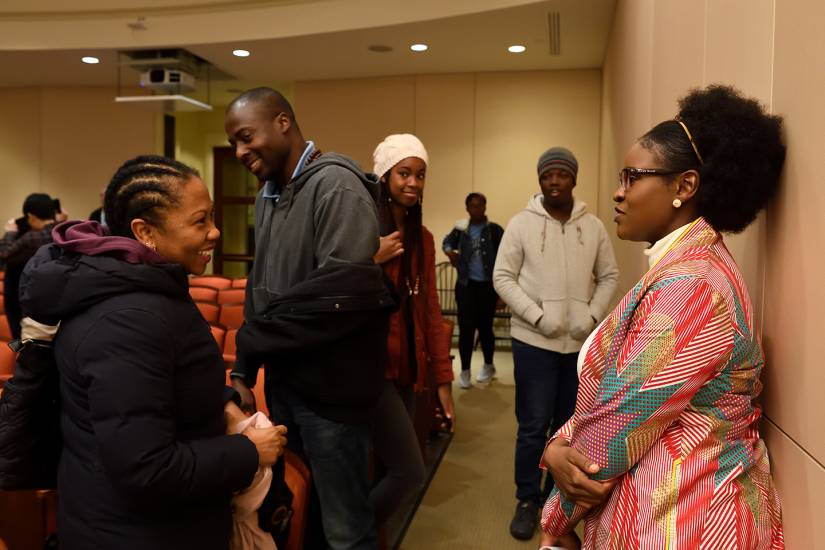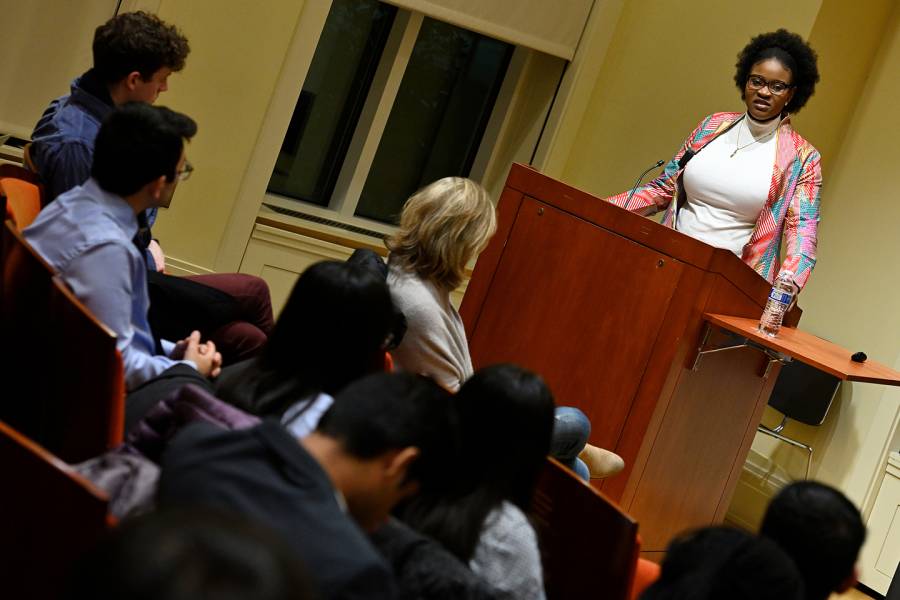Even in exile from her home in Togo, Farida Nabourema has remained on the forefront of the battle for democracy and freedom of speech in her home country.
For eight years, Nabourema has been the face of the movement to oust the president of Togo and bring free elections to the small West African nation. She has written more than 400 articles about her government's corruption, serves as the executive director of the Togolese Civil League, and was named one of the 100 Most Influential Youth in Africa by the Africa Youth Awards.
On Wednesday, Nabourema visited Johns Hopkins University to speak about her experiences supporting democracy in a dictatorship known for violently silencing its critics. The event, held in Mason Hall, was co-sponsored by the Milton S. Eisenhower Symposium, the Foreign Affairs Symposium, and the Stavros Niarchos Foundation Agora Institute as part of its Democracy Dialogues series.
Togo, a former French colony located between Ghana and Benin, first gained independence in 1960. The country became a military dictatorship in 1967 after Gnassingbé Eyadéma ousted the country's first two presidents in military coups. Eyadéma ruled the country as a president until his death in 2005, when his son Faure Gnassingbé was installed as the nation's new leader in yet another military coup.
Nabourema was just 15 when Gnassingbé began his rule. Following his ascension to the presidency, an anti-government rally broke out in which government forces killed three protestors. Following an election two months later, where government forces terrorized and imprisoned opponents of the regime at the polls, protests again broke out, this time resulting in a death toll of more than 400 citizens.
Gnassingbé then abolished a 1992 constitutional rule that ensured limits on leadership, allowing him to remain in power indefinitely. More than 100,000 Togo citizens sought refuge in nearby nations.
Nabourema's activism began as an extension of her father's work resisting the Eyadéma regime. When she was 13, her father was was arrested by government forces, and upon his release, she learned about his history of activism and the abuses of the Togolese dictatorship. But it wasn't until Gnassingbé took power that she truly saw the effects of anti-democratic rule.
"When I first became an activist it was mostly out of anger and out of frustration, because I didn't want to see my dad suffer any longer," Nabourema said. "But it wasn't until I turned 15 that I realized how serious the situation in Togo was."

Image caption: Farida Nabourema speaks with audience members at the MSE Symposium
Image credit: Will Kirk / Johns Hopkins University
In 2008, Nabourema traveled to the U.S. to study at American University. While there, she met other members of the Togolese diaspora, and together they co-founded the Faure Must Go movement—thrusting Nabourema into the crosshairs of his regime.
Since the establishment of the Faure Must Go movement, Nabourema has used social media to promote democracy in Togo, recruit organizers to the cause, and plan actions and demonstrations. In 2016, she briefly returned to her home country, but following an assassination attempt, fled to Ghana under cover of night, beginning her exile. She spent the next year traveling between 13 African nations, leaving everything behind each time she received word that the Togolese government had traced her location.
One of the biggest sacrifices of her activism, Nabourema said, has been the estrangement of her friends and family. In the years since becoming the face of the Faure Must Go movement, Nabourema has lost more than 90% of her friends and family as they distance themselves from her, concerned for their safety and governmental retribution over her actions.
"There are consequences to fighting an authoritarian government," Nabourema said. "I'm very lucky I'm still alive, and I hope I'm going to be alive to see change come to Togo."
Nabourema uses Facebook to communicate with activists in Togo and uses Twitter to gain national attention for their cause. Though she can't return home safely while Gnassingbé is still firmly in power, Nabourema said she is hopeful because the people of Togo have increasingly taken to the streets for biweekly protests against the regime.
"No matter what happens today or tomorrow, there is no way the regime can take us back to the dark days. We have managed to break fear in Togo. We have thousands of people who are freely speaking up against the regime," Nabourema said. "It took a lot of sacrifices and work done by activists for decades."
In America, Nabourema noted, people have the ability to protest against the government and its actions without the fear of being taken from their homes in the dark of the night. Until recently, that hasn't been the case in Togo.
"In Togo we are fighting for the right to have rights. We do not even have rights yet," Nabourema said. "My advice to people with the luxury to speak their mind is not to waste that opportunity."
Posted in Politics+Society
Tagged mse symposium, activism, snf agora institute, democracy dialogues










